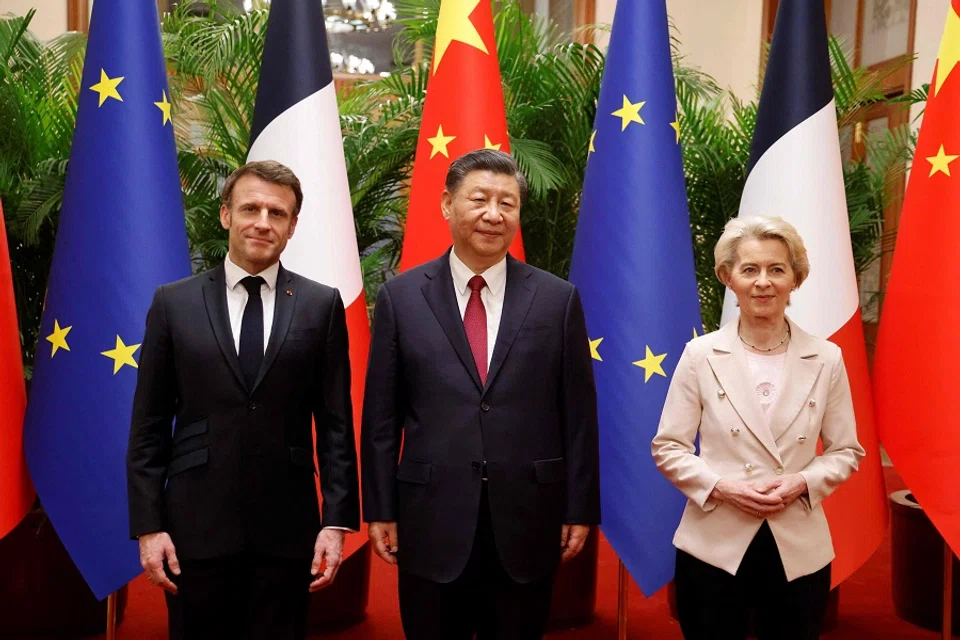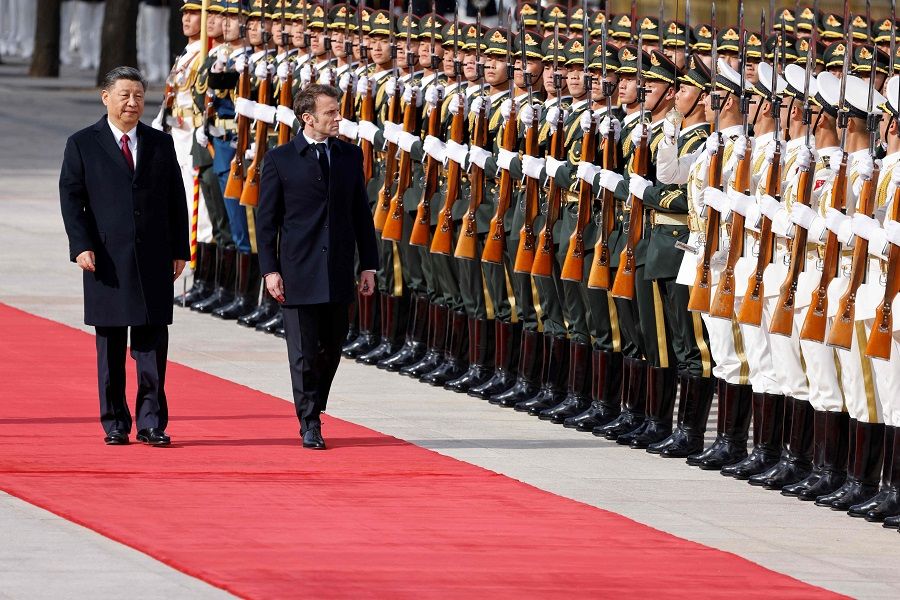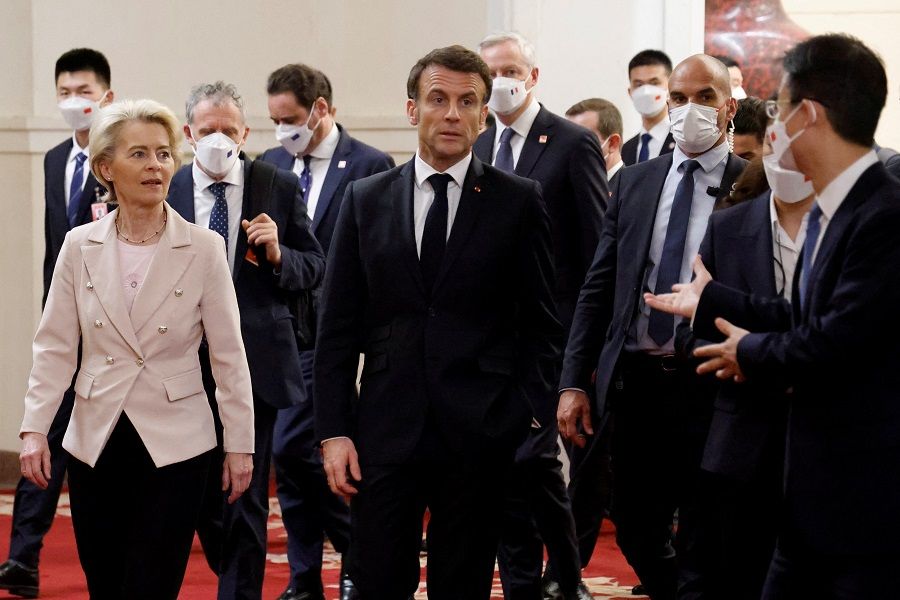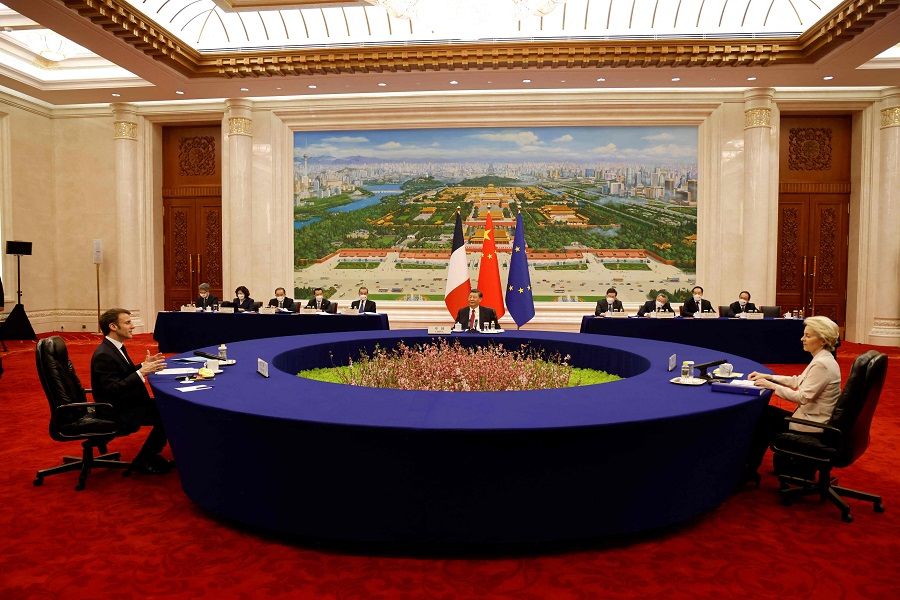Divide and conquer: Beijing's biased treatment of France and EU could backfire

Does China understand the European Union? Beijing's "warm embrace and the cold shoulder" diplomatic strategy to the recent combined visit by French President Emmanuel Macron and European Commission President Ursula von der Leyen suggests a wishful misunderstanding of the EU as an institution, with the effect likely to further alienate EU member states.
China has long sought to develop a wedge strategy to keep the EU out of the burgeoning US-Sino geopolitical confrontation. To achieve this Beijing has played on the EU's desire to chart its own course with China, while trying also to exploit internal EU divisions towards the Middle Kingdom.
European leaders receive different welcomes in Beijing
This divide and conquer approach was on full display for the Macron and von der Leyen visit. The French president was serenaded not only with the full ceremony of an official state visit, including military parades, a state banquet and a ceremonial greeting at the Grand Hall of the People, but also with significant personal time with President Xi.
Von der Leyen on the other hand, who delivered a tough-talking speech on de-risking the EU's economic relationship prior to arriving in Beijing, was treated to a low-key schedule that began with an airport welcome from China's little known ecology minister. Her itinerary involved none of the pomp and ceremony afforded Macron and left the European Commission president isolated from Xi during much of the visit.
Beijing's goal was to isolate the more hawkish von der Leyen, while playing to France's desire for European "strategic autonomy", as well as Macron's personal desire to play the great international statesman.
Chinese media supported the "warm embrace, cold shoulder" strategy by focusing attention on Macron and Xi while leaving the European Commission president with little, or negative coverage, with one media site associated with the Ministry for Defence describing her as a "well-known pro-American" who "sold the EU to fatten the US".

Beijing's goal was to isolate the more hawkish von der Leyen, while playing to France's desire for European "strategic autonomy", as well as Macron's personal desire to play the great international statesman. It seems the charm offensive on the French president had the desired effect, with Macron reported as saying the "personal time Xi is devoting to the visit shows that France is not considered to be a country like any other". Yet isolating the European Commission president in favour of the French president is a losing EU strategy that misunderstands the role and status of a key EU institution.
By treating the EU president to second-class diplomacy, Beijing is in effect dismissing the representative of all the EU heads of state...
China alienating the EU to its detriment?
While France is undoubtedly an influential member of the EU, it is still only one member out of a block of 27 nations. The EU Commission on the other hand is the block's executive arm answerable only to the European Council which comprises the heads of state of the EU's members and the European Parliament. Furthermore, the Commission is the sole EU institution for tabling new laws, is the enforcer of existing laws and represents the EU internationally.
By treating the European Commission president to second-class diplomacy, Beijing is in effect dismissing the representative of all the EU heads of state, and also sidelining an incredibly powerful EU bureaucracy leader tasked with proposing and enforcing rules, many of which directly touch China's interests. The actions, statements and priorities of the Commission should be taken as always in strong alignment with a majority of EU members, and therefore reflective of the pressure points in the relationship which Beijing needs to attend to.
For example, in 2019 the European Commission's strategic outlook paper identified China as a cooperating partner, a negotiating partner, an economic competitor, and with a novel but telling new expression also as "a systemic rival". Notably, the language of "systemic rivalry" is reminiscent of realist power politics that has increasingly characterised Beijing's relationship with the US, but which Brussels and Beijing have sought hard to avoid. Yet since that 2019 report the EU-China relationship has fallen on increasingly hard times.

The bilateral breakdown goes back to the European Parliament's freezing of the Commission-negotiated Comprehensive Agreement on Investment in May 2021, after a tit-for-tat sanctions tussle started by EU sanctions on Chinese officials over human rights concerns in Xinjiang, resulting in Beijing counter-sanctioning a number of EU lawmakers.
While that was something of an impromptu diplomatic skirmish, other EU-led regulatory moves show a far more considered shift in member attitudes towards China. These include an EU foreign subsidies regulation aimed primarily at Chinese state capitalism, an EU anti-coercion instrument aimed at protecting against economic coercion, and more recently a proposed Critical Raw Materials Act which is representative of a new modality of EU-China economic relations grounded in the concept of economic de-risking.
The raw materials act proposes benchmarks for 2030s that include at least 10% of the EU's annual consumption extracted within the EU; at least 40% of the EU's annual consumption processed in the EU; and not more than 65% of the Union's annual consumption of strategic raw materials from a single third country. Given China currently dominates major parts of the global critical mineral supply, the EU raw materials act is undoubtedly aimed at Beijing.
EU taking a tougher stance
This brings us full circle back to the April 2023 von der Leyen visit to China. In a speech that pulled no punches just days before heading to Beijing, von der Leyen stated that the "Chinese Communist Party's clear goal is a systemic change of the international order with China at its centre" based on a policy "to promote an alternative vision of world order".
She warned that China's approach to the Ukraine war would define the EU-China relationship and made a strong case for economic de-risking of EU-China trade. De-risking includes reducing dependencies in key areas, as well as more muscular regulatory tools, friendshoring initiatives, and a proposed outbound investment screening tool. While von der Leyen also rejected the idea of economic decoupling, in practice de-risking implies some degree of strategic decoupling.
Anyone who thinks they can deal effectively with the European Union by sidelining its most powerful institutions, while feting single member heads of state, is suffering from a misunderstanding of how the EU works...

As the Macron and von der Leyen visits came to a close, the post mortem assessment showed that the French president secured some new business agreements but failed elsewhere. Macron suffered widespread criticism for appearing weak on Taiwan, ineffectualness on Ukraine, and a delusional view of EU strategic autonomy. Whereas one EU parliamentarian described von der Leyen's approach to China as indicating a "better alternative".
Ultimately, von der Leyen's March 30th speech characterises the EU that China will have to deal with, and the EU Commission's programme for economic de-risking should be setting off alarm bells in Zhongnanhai. Furthermore, Beijing should reflect on the fact that von der Leyen is not simply stating her personal views on EU-China relations, but rather is representing the European Council, consisting of all the heads of state of EU members.
Yet beyond representation, the Commission and its president are powerful actors in their own right, with the ability to shape policy agendas, propose new laws and enforce regulations. Anyone who thinks they can deal effectively with the European Union by sidelining its most powerful institutions, while feting single member heads of state, is suffering from a misunderstanding of how the EU works - and as a result, sure to play a losing diplomatic hand.
Related: Macron's visit: China making a tear in the 'iron curtain' drawn by the US? | Not too far, not too close: The French way of handling China | France's Indo-Pacific strategy in creating a multipolar global order | Germany and Europe a pawn of the US? | China's diplomacy in full swing after 20th Party Congress
